Tuesday  night, Michael Phelps won his 21st Olympic Gold medal (25 medals total) and prevailed over rival swimmer Chad Le Clos of South Africa. While he made history in the pool, what happened behind the scenes created juicy headlines. Like any good rivalry, the history between Phelps and LeClos includes years of sharp words, insults, and both victories and losses. Right before the Olympic showdown, LeClos did his best to get inside Phelps’ head. In the warm up area, Le Clos stood right in front of Phelps while jumping around and shadow boxing. Phelps, whose mental warm up is centered around quiet reflection while listening to music, did his best to look unaffected, but his face said it all.
night, Michael Phelps won his 21st Olympic Gold medal (25 medals total) and prevailed over rival swimmer Chad Le Clos of South Africa. While he made history in the pool, what happened behind the scenes created juicy headlines. Like any good rivalry, the history between Phelps and LeClos includes years of sharp words, insults, and both victories and losses. Right before the Olympic showdown, LeClos did his best to get inside Phelps’ head. In the warm up area, Le Clos stood right in front of Phelps while jumping around and shadow boxing. Phelps, whose mental warm up is centered around quiet reflection while listening to music, did his best to look unaffected, but his face said it all.
Ultimately, a grimaced face is the only reaction Phelps gave to LeClos’ provocation. He would not be baited into a pre-game distraction. He continued with his traditional warm up routine, avoided the purposeful stares coming from LeClos and won twice.
Phelps never lost his focus.
He never devoted his attention to the circus around him, whether it be Le Clos himself, mentions of the London games, talk of redemption, or the milestone of 20 Gold Medals. Phelps was centered. He remained in control. He continued with his usual routine, stayed focused, and was victorious.
In our daily lives, we are surrounded by noise. The market goes up. The market goes down. Leaders retire. New leaders come on board. Companies merge. Companies go bankrupt. Contracts are won. Contracts are lost. Companies reorganize. There are layoffs, hiring freezes, and acquisitions. And we never get a break from email, text, instant message, and social media alerts.
Focus can be the hardest part of a leader’s job, yet it’s one of the most important aspects.
In 2015, there were 122 business emails sent per user, per day. Worldwide, 16 million text messages are sent per minute. In one minute, 300 new hours of video are uploaded to YouTube and 347,222 new Tweets are sent.
With all of these incoming distractions, staying present, mindful, and focused on the goal is, to some extent, a preservation tactic. You have a finite amount of physical and cognitive energy to spend every day. Once you’ve depleted your resources, your decision-making ability, mental, and emotional health begin to suffer. Staying focused on the most relevant tasks of the day means you’re bringing your best self to the table where it matters most. And, it’s good for your health!
According to Reuter’s “Dying for Business” report, 33 percent of managers were suffering ill health as a direct result of information overload.
There’s nothing standing between you and becoming more mindful and focused. With dedicated practice, coaching and self-discipline, you can retrain your brain to filter out distractions, focus on what’s important, and take charge of your own cognitive and physical health. Take charge of your brain today. Control the information you consume and stop letting your energy be hijacked by temptations and bait.
